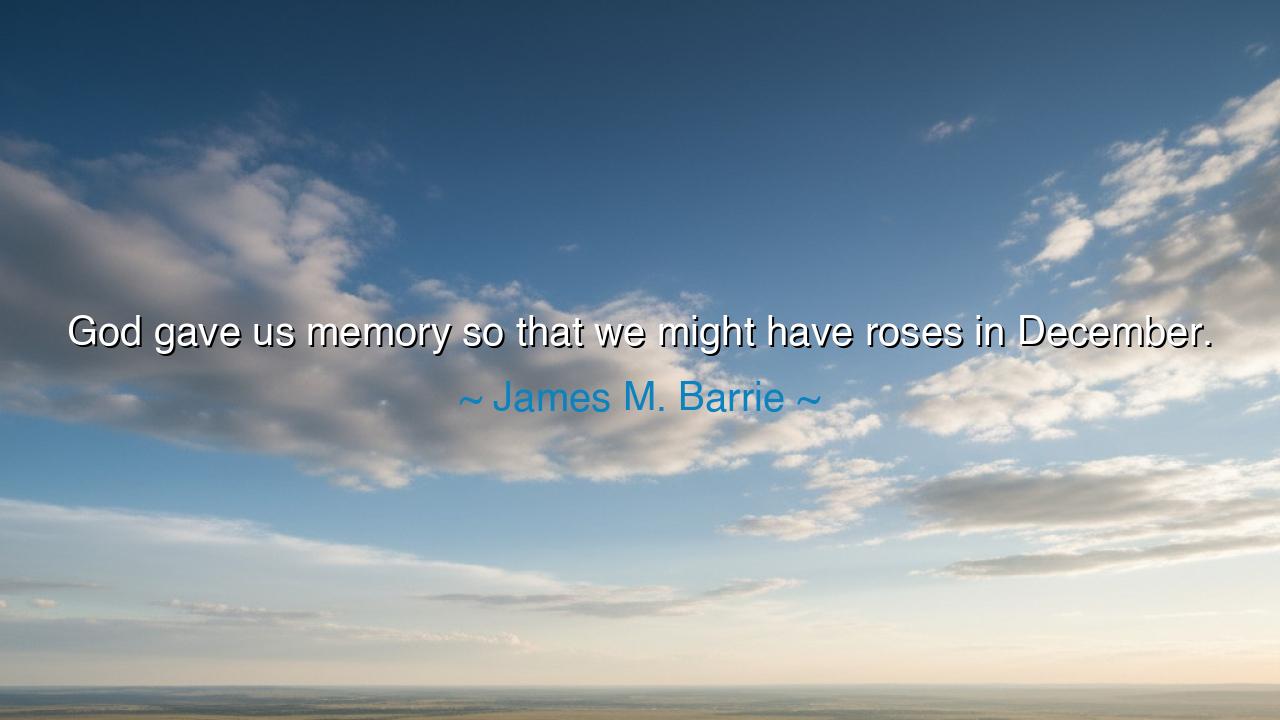
God gave us memory so that we might have roses in December.






Hear the gentle and immortal words of James M. Barrie, the Scottish dreamer and creator of Peter Pan, who once wrote: “God gave us memory so that we might have roses in December.” In this tender and timeless thought, Barrie speaks not only of remembrance, but of the divine mercy that softens life’s winters with the fragrance of the past. He reminds us that when the gardens of our youth have withered, when the warmth of love seems far away, and when time has stripped the world of its color, memory remains—the immortal flower that blooms within the soul, unfading even amid frost.
The origin of this quote lies in Barrie’s deep reflections on loss, nostalgia, and the human heart’s yearning to preserve beauty. Though he is best known as the creator of the boy who would never grow up, Barrie himself lived a life marked by sorrow and introspection. He lost his brother in childhood, endured unfulfilled love, and often carried a quiet melancholy behind his whimsical stories. Yet through it all, he came to see that even grief has its gifts. Out of his pain bloomed wisdom, and from his solitude came insight: that God, in His compassion, gave mankind memory not merely as a faculty of the mind, but as a sanctuary for the heart. In memory, joy endures beyond time’s reach; in memory, even the dead may live again in tenderness.
To say that “God gave us memory so that we might have roses in December” is to understand that life’s beauty is fleeting, but its echo is eternal. The rose, symbol of love and vitality, cannot bloom in winter’s cold—but in the garden of remembrance, it never dies. Our memories are divine gifts, meant to comfort us when the world grows barren, when youth fades, and when laughter becomes a distant sound. Through them, the soul can return to the summers of its joy—to the faces of those long gone, to the scent of old places, to the warmth of first love or a mother’s embrace. Memory transforms the passing into the permanent, the fragile into the immortal.
Consider the story of Helen Keller, who, though blind and deaf from infancy, carried within her a world brighter than most could see. Deprived of sight and sound, she lived through the memory of touch—the recollection of her teacher Anne Sullivan’s guiding hand, the rhythm of words pressed into her palm. Even in her later years, when the world’s noise and color remained beyond her reach, she said she could still “feel the sunshine in my soul.” Her memories were her roses, blooming in the December of her limitations, proof that beauty endures wherever love once touched the heart.
Barrie’s wisdom also teaches that memory is not only for comfort—it is for gratitude. Too often, we mourn what is gone instead of cherishing that it ever was. To remember rightly is to give thanks for the seasons of abundance that once filled our lives. When the fire of youth has burned low, when friends have departed, or when the voice of a beloved is silenced, memory whispers: “You were blessed to have known this.” Every recollection, whether sweet or sorrowful, becomes a thread in the tapestry of grace. For the same God who gives joy also gives remembrance, so that joy might never fully perish.
Yet there is a sacred warning hidden in Barrie’s words: memory is a gift, but it can also be a chain if misused. The wise do not dwell forever among their memories, for even roses, if clutched too tightly, will draw blood. We must visit the gardens of the past with reverence, not captivity—taking from them their beauty and their lessons, then returning to the present with renewed peace. The purpose of memory is not to imprison the soul in what was, but to strengthen it for what is to come.
Therefore, let this truth be written upon the heart: cherish your memories as divine blossoms. When the cold winds of hardship or age arrive, do not despair; instead, warm yourself by the fire of remembrance. Recall the love that shaped you, the kindness that healed you, the laughter that carried you. Keep them close, as roses in winter, and they will sustain you when all else fades.
And so, O listener of time, remember the grace within Barrie’s words: God gave us memory not to mourn the past, but to preserve its beauty. In the garden of the mind, where faith and love take root, nothing truly beautiful ever dies. The summers of your life may pass, but the roses remain—alive in the soul, fragrant with eternity. Tend them gently, visit them often, and they will remind you that even in December, God’s warmth endures.






AAdministratorAdministrator
Welcome, honored guests. Please leave a comment, we will respond soon